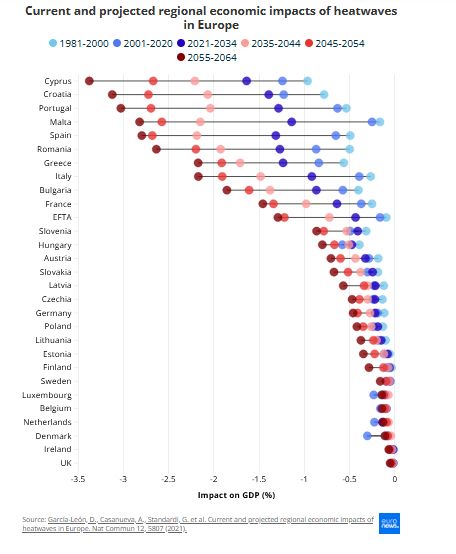Rising temperatures are already affecting Europe’s economy, with researchers warning that GDP losses and labor productivity will worsen in the coming decades.
Last year was the warmest year on record both in Europe and globally, with temperatures surpassing all previous levels measured since 1850. Globally, the past decade also marks the warmest decade ever recorded.
Countries such as Cyprus, Croatia, Portugal, Malta, Spain, and Romania are facing the highest estimated economic losses, as reported by Euronews.
Economic impacts will sharply increase
Europe is the continent with the fastest warming on Earth, with temperatures rising twice as much as the global average rate from the 1980s, according to the European climate status report.
Several studies show that the increasing frequency of heatwaves is already significantly impacting the European economy, leading to GDP losses and labor productivity. Experts warn that these economic effects will sharply increase in the coming decades.
The effects of rising temperatures vary significantly across Europe, but Euronews analyzes which countries are facing the largest losses.
In a study published in Nature Communications, David García-León, a scientific advisor at the Ministry of Agriculture in Spain, and his colleagues examined heatwaves during four exceptionally hot years - 2003, 2010, 2015, and 2018 - and compared their impact with the reference historical period of 1981-2010.
In these selected years, the total estimated economic damages caused by heatwaves ranged between 0.3% and 0.5% of Europe's Gross Domestic Product (GDP).
This represents 1.5 to 2.5 times the average annual economic losses caused by extreme heat in the period 1981-2010, which amounted to approximately 0.2% of GDP.
Economic losses caused by heatwaves are projected to increase from the historical average of 0.21% of GDP (1981–2010) to:
- 0.77% in 2035–2045
- 0.96% in 2045–2055
- over 1.14% by the 2060s
Southern Europe faces the biggest losses
Countries such as Cyprus, Croatia, Portugal, Malta, Spain, and Romania present the highest economic losses in current estimates, with impacts reaching or exceeding -2.5% of GDP by the period 2055–2064.
Greece and Italy (both -2.17%) and France (-1.46%) are also expected to experience significant losses by 2060.
All these countries are already vulnerable due to their warmer climate, and are anticipated to record the most dramatic increases in heatwave-related damages.

The United Kingdom, Ireland, Denmark, the Netherlands, and Belgium are expected to face a relatively smaller impact on GDP, generally staying below -0.5% even in the most pessimistic scenarios.
However, almost all countries, even in cooler regions, show a consistent downward trend, indicating worsening effects over time.
Labor productivity losses
The 2024 OECD report by Hélia Costa, an economist at the OECD, and her colleagues, covering 23 countries - including 21 in Europe, along with Japan and South Korea - finds that high temperatures reduce labor productivity.
The research is based on detailed weather data and financial information from over 2.7 million firms between 2000 and 2021.
Both the increase in the number of days with high temperatures and the occurrence of heatwaves substantially reduce labor productivity.
Baseline estimates show that ten additional days with temperatures above 35°C per year lead to a 0.3% reduction in annual labor productivity of firms. This decreases to 0.2% when dealing with temperatures above 30°C.
When the temperature exceeds 40°C, the impact increases sharply - reducing productivity by over 1.5%, reaching 1.9%. The effects range from -1.1% to -2.7%, suggesting that in this extreme scenario, losses could exceed 2.5%.

